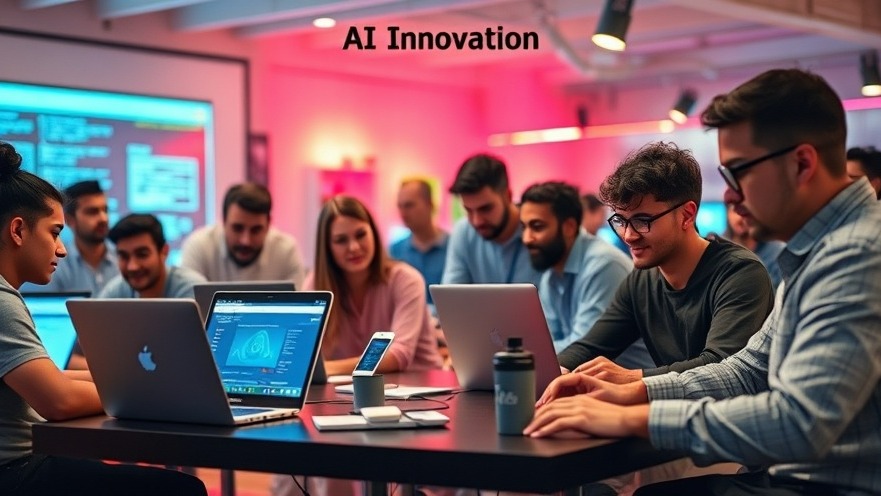
Unlocking Complex Codebases with Claude on Google Cloud
In the realm of software development, time is an invaluable resource. A recent case study demonstrated the transformative impact of Augment Code utilizing Claude on Google Cloud's Vertex AI. This sophisticated AI has drastically reduced project timelines, compressing what used to take months into mere weeks. By leveraging Claude's understanding of complex codebases, developers can navigate and manage intricate software systems with newfound confidence and efficiency.
A Paradigm Shift in Software Development
According to industry insights, Augment's innovative use of Claude has led to a remarkable decrease in developer onboarding, slashing it from weeks to just days. The company has processed millions of lines of code across various customer codebases, showcasing Claude's ability to understand the fine details of enterprise systems. “You can't write a line of code without understanding that context,” notes Igor Ostrovsky, the CTO and co-founder of Augment. This highlights the importance of an AI that is intimately familiar with the code it’s assisting with—a game-changer in a field where traditional tools often fall short.
Why Claude Stands Out
After evaluating several AI models, Augment selected Claude for its superior code understanding capabilities. Scott Dietzen, co-founder at Augment, remarked that Claude's abilities outclassed other coding models, making it the right choice for their production environments. This selection is backed by strong security features that come with SOC 2 Level 2 certification, ensuring customer data remains protected within Google Cloud's infrastructure. Thus, Claude not only streamlines coding but also fortifies security—making it a dual threat in the software development arena.
How Claude Enhances Development Workflows
Claude revolutionizes the software development process by providing several key enhancements to existing workflows. Here are some standout features:
Contextual Code Understanding: Developers can engage with their codebase conversely, enabling faster comprehension and integration of new areas.
Impact Analysis: It assesses the implications of potential code changes, mapping out risks and dependencies across the entire codebase.
Intelligent Code Reuse: Rather than generating new code, Claude identifies and suggests existing libraries, promoting efficiency.
Documentation Generation: Claude aids in creating and maintaining up-to-date technical documentation, thus driving accuracy and consistency.
Change Propagation: Once a piece of code is modified, Claude identifies all related elements that need attention, encompassing everything from databases to application programming interfaces (APIs).
The Democratization of Software Development
Perhaps the most significant trend catalyzed by Claude is its role in democratizing software development. No longer is coding the exclusive domain of experienced developers; teams from marketing to sales are now empowered to create their own solutions without IT bottlenecks slowing them down. This democratization creates an environment ripe for innovation and efficiency as every department has a hand in building tools tailored to their specific needs.
Challenges and Considerations
However, this AI-driven transition isn't without its challenges. Security concerns remain a priority, as noted by Georgetown’s Center for Security and Emerging Technology, stating the vulnerabilities associated with AI-generated code require vigilance. Additionally, the quality of AI-generated code is a pertinent issue; some studies have shown a significant increase in bugs associated with AI-assisted development. Moreover, labor dynamics are shifting—while fears persist regarding job security for developers, many experts suggest that AI tools elevate roles rather than eliminate them, allowing developers to focus on innovative architecture and higher-value tasks.
Looking Ahead: The Future of AI in Coding
Industry projections reveal that by 2028, approximately 75% of enterprise software engineers will utilize AI coding assistants—an upward shift from less than 10% at the beginning of 2023. As competition intensifies, with companies like OpenAI and Google stepping up their game, tools like Claude will likely continue evolving, offering features that align closely with developers' workflows. The trajectory is clear: AI is not just reshaping software development—it's revolutionizing it.
Conclusion
The integration of Claude AI into software development presents a transformative opportunity, unlocking efficiencies that were previously unattainable. Whether you're part of a technical team or a department looking to innovate, grasping the capabilities and potential of AI tools like Claude is essential in today's technology-driven environment. Embrace this change and explore how AI can streamline your development processes, allowing for greater agility and creativity in your projects.
 Add Row
Add Row  Add
Add 




 Add Row
Add Row  Add
Add 

Write A Comment